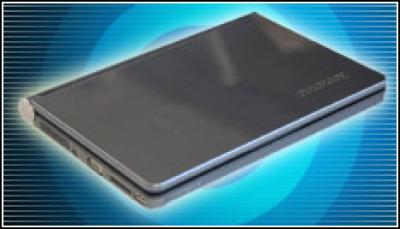

Computer maker Asus has stopped selling any versions of its popular Eee netbooks with Linux in the UK, explaining that the move has been made because people prefer Windows XP.
Asus virtually invented the netbook with the Eee, a low-cost machine first launched in late 2007 running Linux. Now, although Asus’ site lists several versions of the Eee supplied with Linux, the company has confirmed that it can supply no Linux Eee models at all – according to a phone call to the company, all the machines it sells come XP.
The Asus site lists nine models of Eee PC, including the new Seashell. All of them are listed with GNU Linux as an option and, for the Eee 1000, Gnu is the only option according to the site (see screen-grab below). A more detailed product sheet lists 26 versions, all but four of which can have Linux as an operating system.
However, on the phone to Asus, it is clear that none of these Linux versions are available from Asus. “It’s been a gradual migration over the last three months,” said a sales executive who answered Asus’ public number. “People have preferred Windows XP.”
Asking for a Linux Eee, eWEEK Europe was given two options: an Eee with a 7in screen, on sale from Misco, and one with a 9 in screen, sold by Toys R Us. Could we have Linux if we bought an order of 500 machines? “That’s doubtful,” we were told. “We haven’t done that yet.”
At a product launch last week – of the SeaShell and other machines – Asus defended its decision to move to XP, blaming other vendors for changing expectations and moving the market.
“When we launched the Eee PC we launched it with Linux and people were quite pleased with it,” said John Swatton, marketing specialist at Asus. “Then HP and Dell came along and said ‘Why are you buying Asus, with a small hard drive? Buy ours with a big hard drive.'”
Other vendors offered netbooks with XP, and Asus began losing market share, said Swatton. As a smaller company whose brand is less well-known, Asus had no choice but to follow the market, producing more fully-featured and expensive netbooks (including reported plans for one with an 11.6 in screen).
However, now netbooks have become 20 percent of the notebook market – by units sold – and Asus has benefitted, so the company might try and buck the trends in future when it is better known. “Brand awareness is important in the channel,” said Swatton. “We’ll keep raising the bar, and each time we’ll raise our awareness”.
Although Microsoft has won the battle to provide the netbook operating system, it might cost the company a great deal, said open source advocate Mark Taylor of Sirius IT: “Microsoft had to sell an obsolete operating system – nearly a decade old! – at a huge discount. This has already had a direct and extraordinary effect on both the revenue and profitability of Microsoft’s client division.”
Windows 7 may have a harder time ruling the netbook market, however, if rumours of an Android running Google’s Android version of Linux turn out to be true,
Some of the notebooks that Asus sells still have Linux after a fashion, in the form of a quick-launcher, which fires up a reduced operating system and a browser
Read our review of the Eee 1000H.
Multiple pension funds in Australia have been hit in co-ordinated hacking attacks, and unfortunately customers…
Inspector General at the Pentagon confirms investigation into the use of Signal app by US…
After a two month hiatus following crashes of a new drone model, Amazon has resumed…
Marking 50 years of Microsoft, this editorial reflects on its evolution from startup to tech…
But will Beijing or ByteDance allow sale? Amazon joins potential bidders for TikTok in US,…
Elon Musk dismisses report that Trump told cabinet that he expects Musk to leave his…
View Comments
"Then HP and Dell came along and said 'Why are you buying Asus, with a small hard drive? Buy ours with a big hard drive.'"
"Other vendors offered netbooks with XP, and Asus began losing market share, said Swatton. As a smaller company whose brand is less well-known, Asus had no choice but to follow the market, producing more fully-featured and expensive netbooks"
Couldn't they offer both Linux & XP and let the consumers have a choice to purchase what they like?
Did they have to stop selling with Linux? they sure didn't have to.
MS must have made an offer they couldn't refuse and the heck with the any choice for consumers.
I was planning to buy from Asus but not after this news. For me personally, Acer Aspire one is much more attractive now.
@Abe, of course M$ has most of the OEM market catched by the testicles.
I purchased an Asus EE and I found their choice of Linux OS to be clunky and limited. I put Ubuntu Netbook remix on it and I love it. So that was big part of the problem IMO.
Shan't bother, thanks.
There is a market for Linux netbooks - and those who want one will now not even consider Asus any more (so their stats will become true by selection).
See also my Open letter to Asus: http://blog.marjoleinkatsma.com/its-better-with-windows-heres-why-not
Is it a surprise? For almost 20 years, Linux has proven unable, time after time, to gain the trust of computer users.
Why would this time be different? I'm amazed they keep banging their head against the wall and kicking the same dead horse. Linux is not for consumer computing. Period.